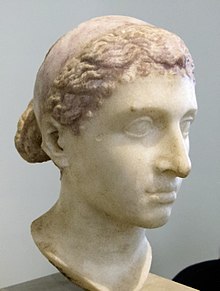
by fljustice | Apr 30, 2011 | Books, Fiction, Reviews
“Anthony and Cleopatra” by Colleen McCullough
I’m on a bit of a Cleopatra kick. Last week I reviewed the biography Cleopatra: A Life by Stacy Schiff. This week it’s a novel by Colleen McCullough. From the book jacket:
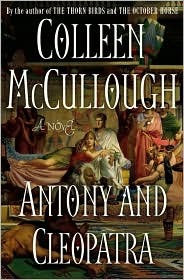 “Caesar is dead, and Rome is, again, divided. Lepidus has retreated to Africa, while Antony rules the opulent East, and Octavian claims the West, the heart of Rome, as his domain. Though this tense truce holds civil war at bay, Rome seems ripe for an emperor—a true Julian heir to lay claim to Caesar’s legacy. With the bearing of a hero, and the riches of the East at his disposal, Antony seems poised to take the prize. Like a true warrior-king, he is a seasoned general whose lust for power burns alongside a passion for women, feasts, and Chian wine. His rival Octavian, seems a less convincing candidate: the slight golden haired boy is as controlled as Antony is indulgent and as cool-headed and clear-eyed as Antony is impulsive. Indeed, the two are well- matched only in ambition.”
“Caesar is dead, and Rome is, again, divided. Lepidus has retreated to Africa, while Antony rules the opulent East, and Octavian claims the West, the heart of Rome, as his domain. Though this tense truce holds civil war at bay, Rome seems ripe for an emperor—a true Julian heir to lay claim to Caesar’s legacy. With the bearing of a hero, and the riches of the East at his disposal, Antony seems poised to take the prize. Like a true warrior-king, he is a seasoned general whose lust for power burns alongside a passion for women, feasts, and Chian wine. His rival Octavian, seems a less convincing candidate: the slight golden haired boy is as controlled as Antony is indulgent and as cool-headed and clear-eyed as Antony is impulsive. Indeed, the two are well- matched only in ambition.”
The Masters of Rome
Anthony and Cleopatra is the last of seven novels, collectively called the Masters of Rome series, covering the end of the Roman Republic in all its twisted glory. The result of this herculean task, is a legacy of some of the best researched historical fiction of this time; meticulously covering politics, battles, people, religious rites, traditions, trade, architecture, etc. The best books of the series draw the reader in with fascinating characters, Machiavellian plots, and scintillating detail. The worst give the reader the sense of reading an entertaining history book. Which is not, necessarily, a bad thing. McCullough had intended to end the saga with The October Horse, but avid fans prevailed and she concluded with this novel, which shows the final end of the Republic and beginning of Empire. (more…)

by fljustice | Apr 26, 2011 | Biographies, Books, Reviews, Wonderful Women
“Cleopatra: A Life” by Stacy Schiff
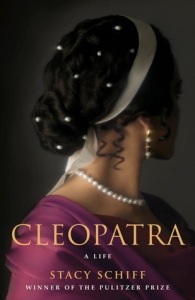 I have a soft spot for strong women in history. I’ve written about Hypatia, the Lady Philosopher of Alexandria; Empress Galla Placidia and her niece Pulcheria who both ruled Rome in its waning days. I’ve read about Boudica, Queen of the Iceni; Amanirenas, the one-eyed warrior queen of Kush; and Zenobia, Queen of Palmyra; all of whom defeated Roman armies, only to succumb later to that massive military machine. Most of my favorites are little known women who ruled countries, commanded armies and navies, dealt astutely with ruling male neighbors and made a difference in their people’s lives. I like to read and write about them because they are little known. I like introducing readers to new characters and broadening the scope of history. Occasionally, I’ll run across a woman I thought I knew, and find out I’m wrong. Cleopatra is one. (more…)
I have a soft spot for strong women in history. I’ve written about Hypatia, the Lady Philosopher of Alexandria; Empress Galla Placidia and her niece Pulcheria who both ruled Rome in its waning days. I’ve read about Boudica, Queen of the Iceni; Amanirenas, the one-eyed warrior queen of Kush; and Zenobia, Queen of Palmyra; all of whom defeated Roman armies, only to succumb later to that massive military machine. Most of my favorites are little known women who ruled countries, commanded armies and navies, dealt astutely with ruling male neighbors and made a difference in their people’s lives. I like to read and write about them because they are little known. I like introducing readers to new characters and broadening the scope of history. Occasionally, I’ll run across a woman I thought I knew, and find out I’m wrong. Cleopatra is one. (more…)

by fljustice | Mar 31, 2011 | Books, Fiction, Free stuff, Reviews
“Outlaw” by Angus Donald
As a kid, I fell in love with Robin Hood. Errol Flynn swashbuckling through the forest all clean and pretty. The collected stories I read over and over again. The 50’s TV show (written by blackballed Hollywood writers with a decided anti-McCarthyism bent) with the stirring theme song:
Robin Hood, Robin Hood
Riding through the glen.
Robin Hood, Robin Hood
With his band of men.
Feared by the bad, loved by the good.
Robin Hood, Robin Hood, Robin Hood.

Robin Hood Memorial at Nottingham by James Woodford
Okay, it’s more stirring with the music. (You can listen here.) Growing up, the legend of Robin Hood was everywhere as the ultimate hero who stood up for the little guy against evil oppressors: corrupt sheriffs and greedy churchmen. We all knew the stories of loyal Little John, the strong right hand man; tipsy Friar Tuck; Will Scarlet, handy with a sword; Alan A-Dale the minstrel; and the chaste, beautiful and smart Maid Marian, Robin’s enduring love. After stirring adventures, good King Richard arrives in time to pardon the outlaws, give them lands and titles and join Robin and Marian in marriage.
It’s an iconic tale of good vs. evil and happily-ever-afters that attracts artists back to the theme over and over. Numerous books have updated the story or tinkered with the timelines. Directors have put their own stamp on the story from the Mel Brooks’satirical “Men in Tights” to the most recent Ridley Scott entry, where yeoman Robin is responsible for the Magna Carta. It’s very hard to bring something new or fresh to the story.
(more…)

by fljustice | Mar 20, 2011 | Books, Fiction, Free stuff, Interviews
Author Interview: Melanie McDonald
It’s been way too long since I posted an author interview on this blog, but finally found a great candidate. Melanie McDonald just published an acclaimed new literary historical novel Eronemos about Emperor Hadrian’s doomed young lover Antinous. From the back:
 “Eros and Thanatos converge in this story of a glorious youth, an untimely death, and an imperial love affair that gives rise to the last pagan god of antiquity, Antinous.
“Eros and Thanatos converge in this story of a glorious youth, an untimely death, and an imperial love affair that gives rise to the last pagan god of antiquity, Antinous.
In this coming-of-age novel set in second century Rome, the Greek youth Antinous of Bithynia recounts his seven-year affair with Hadrian, the fourteenth Roman emperor. In a partnership more intimate than Hadrian’s political marriage, Antinous captivates the most powerful ruler on the earth.
This version of the story of the emperor and his beloved ephebe envisions the life of the youth who after death achieved apotheosis as a pagan god whose cult of worship lasted for hundreds of years, and gives voice to Antinous, whose image still appears in museums around the world.”
Ms. McDonald not only agreed to an interview, but provided a signed copy as a giveaway (details at the end of the post.)
Faith L. Justice: I’m sure two of the first questions readers have for you is, “How do you pronounce the title?” and “What does it mean?” (more…)
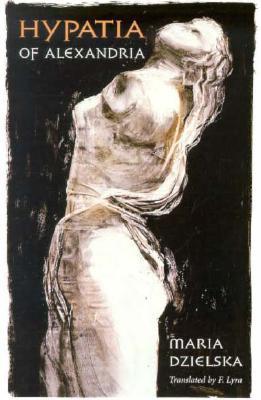
by fljustice | Mar 12, 2011 | Biographies, Books, Hypatia, Reviews, Wonderful Women
Hypatia of Alexandria: Two Books
It’s March—Women’s History Month and the anniversary of a remarkable woman’s death. In AD 415, a Christian mob murdered Hypatia, the renowned Lady Philosopher of Alexandria. The vicious act shocked the city and shamed the early Church. Socrates Scholasticus tells the story in his Historia Ecclesiastica:
“Hypatia, daughter of the philosopher Theon, who made such attainments in literature and science, as to far surpass all the philosophers of her own time…For all men on account of her extraordinary dignity and virtue admired her the more. Yet even she fell a victim to the political jealousy which at that time prevailed. For as she had frequent interviews with Orestes, it was calumniously reported among the Christian populace, that it was she who prevented Orestes from being reconciled to the bishop. Some of them therefore, hurried away by a fierce and bigoted zeal, whose ringleader was a reader named Peter, waylaid her returning home, and dragging her from her carriage, they took her to the church called Caesareum, where they completely stripped her, and then murdered her with tiles. After tearing her body in pieces, they took her mangled limbs to a place called Cinaron, and there burnt them. This affair brought not the least opprobrium, not only upon Cyril, but also upon the whole Alexandrian church. And surely nothing can be farther from the spirit of Christianity than the allowance of massacres, fights, and transactions of that sort. This happened in the month of March during Lent, in the fourth year of Cyril’s episcopate, under the tenth consulate of Honorius, and the sixth of Theodosius.”
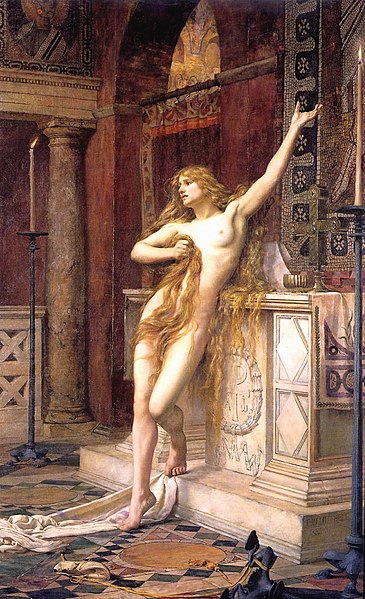
Hypatia, painted by Charles William Mitchell in 1885.
Since that time, only fragments about Hypatia’s life have come down to us; allowing poets, novelists, playwrights, scientists, feminists and religionists (both pro and anti) to appropriate her story for themselves. Her story has resonated down through the years, touching many people. She’s a major character in my novel Selene of Alexandria, the subject of the recent movie Agora directed by Alejandro Amenabar, and she rated a plate in Judy Chicago’s massive art piece The Dinner Party. She’s the subject of plays, poetry, propaganda and new age pagan polemics. Her life is represented in art and music. But what do we really know about her? Not much.
In researching my novel, I waded through a literary swamp, with no guide, trying to get at some coherent view of Hypatia and her story. She was young/middle aged/older when she died. She was single/married/promiscuous/virginal. She was a pagan/witch/Christian. She was a brilliant mathematician/scientist to some and, according to others, contributed nothing worthwhile in either discipline. I read the few primary sources, but didn’t have the academic background to evaluate their usefulness. Socrates was a contemporary, but a church historian. Damascius was a pagan who wrote a full generation later. John of Nikiu wrote 200 years later. Who had an agenda and what was it?
Two scholars have attempted to pull the pieces together in book form in the last two decades: Maria Dzielska, a Polish classics scholar, with Hypatia of Alexandria; and mathematics professor Michael A. B. Deakin with Hypatia of Alexandria: Mathematician and Martyr. I’ve read both, several times, in my research and want to share my thoughts. (more…)
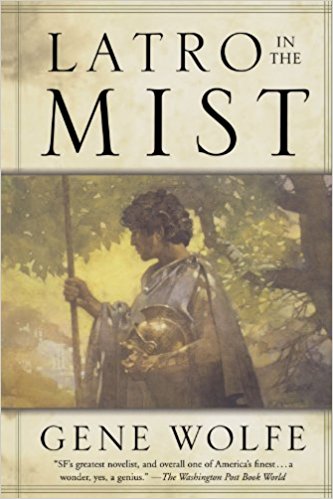
by fljustice | Feb 24, 2011 | Books, Fiction, Reviews
“Latro in the Mist” by Gene Wolfe
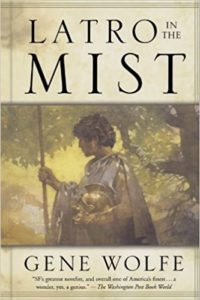 I occasionally run across a book that challenges me; that makes me work for the story and enjoy the labor; that awes me with the craft of the writing. Usually these are considered “literary novels.” I also find a lot of literary novels tedious, because I’m partial to plot-driven stories. But Latro in the Mist surprised me. It’s a fantasy novel with gods and ghosts (which may not be real, see my discussion below.) It’s a historical novel about real events set in Greece in 479 B.C., and populated with historic characters. It’s also a finely crafted literary novel that makes the reader think beyond the story and characters about the nature of memory and self, friendship and loyalty, and the journey that is life. (more…)
I occasionally run across a book that challenges me; that makes me work for the story and enjoy the labor; that awes me with the craft of the writing. Usually these are considered “literary novels.” I also find a lot of literary novels tedious, because I’m partial to plot-driven stories. But Latro in the Mist surprised me. It’s a fantasy novel with gods and ghosts (which may not be real, see my discussion below.) It’s a historical novel about real events set in Greece in 479 B.C., and populated with historic characters. It’s also a finely crafted literary novel that makes the reader think beyond the story and characters about the nature of memory and self, friendship and loyalty, and the journey that is life. (more…)

“Caesar is dead, and Rome is, again, divided. Lepidus has retreated to Africa, while Antony rules the opulent East, and Octavian claims the West, the heart of Rome, as his domain. Though this tense truce holds civil war at bay, Rome seems ripe for an emperor—a true Julian heir to lay claim to Caesar’s legacy. With the bearing of a hero, and the riches of the East at his disposal, Antony seems poised to take the prize. Like a true warrior-king, he is a seasoned general whose lust for power burns alongside a passion for women, feasts, and Chian wine. His rival Octavian, seems a less convincing candidate: the slight golden haired boy is as controlled as Antony is indulgent and as cool-headed and clear-eyed as Antony is impulsive. Indeed, the two are well- matched only in ambition.”








